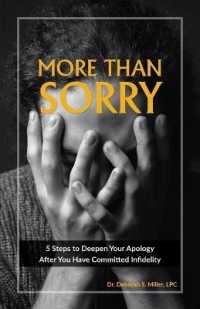- ホーム
- > 洋書
- > 英文書
- > Literary Criticism
Full Description
Provides the English-speaking reader with a comprehensive guide to the fiction of Alfred Döblin, a major figure in German and European literary modernism.
Alfred Döblin was born into a Jewish family in 1878 and grew to become a leading German literary figure before he had to flee from the Nazis in 1933. His big-city novel Berlin Alexanderplatz (1929) is often compared to Joyce's Ulysses, but Döblin had been exploring modern narrative techniques since the early 1900s, and his themes were entirely his own. In view of the highly diverse character of his fictions and their settings-ranging from Europe to China and South America, and from the sixteenth century to the twenty-seventh-the first four chapters of this book present them according to broad thematic concerns-Person, Power, Nature and Culture-rather than chronological sequence. The aim is to encourage readers to identify aspects of his writing that they would like to investigate further for themselves.
The introduction provides initial orientation in Döblin's early thinking and the way he conceived the writer's task, and that is followed by a concise description of his family background and his subsequent personal biography. The final two chapters focus respectively on the development of his skill in the deployment of specific narrative techniques and on how historical circumstances affected his philosophical and religious orientation in the course of his adult life, from the language skepticism of his early years and his professed agnosticism in the 1920s to his late conversion to Catholicism.
Contents
Preface
Introduction: Alfred Döblin: A Biographical Sketch
1: Person
2: Power
3: Nature
4: Culture
5: Narrative Styles and Techniques
6: Ideas and Beliefs
Bibliography
Index







